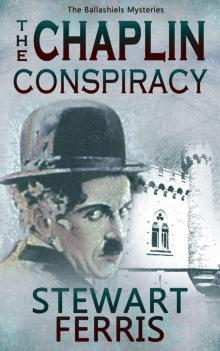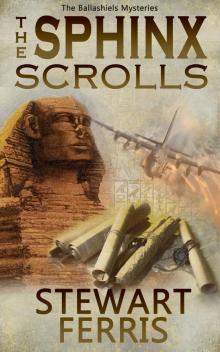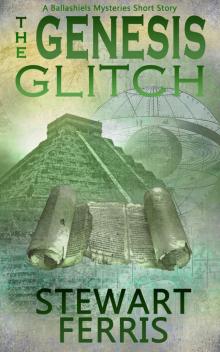- Home
- Stewart Ferris
The Dali Diaries (The Ballashiels Mysteries Book 2) Page 12
The Dali Diaries (The Ballashiels Mysteries Book 2) Read online
Page 12
‘Of course not. We’d have heard if it was being unlocked.’
‘What if the door was not locked in the first place?’ he suggested. ‘A twist of the key back and forth can sound like the lock is turning whilst leaving the door open.’ Rocco approached the door and gripped the handle. ‘I believe,’ said Rocco, ‘that we are not waiting for him. He is waiting for us.’
‘Rubbish.’
‘If we go and look for his office, I bet we’ll find him sitting in there playing cards with the security guard, waiting for us to prove we are worthy of membership of whatever their organisation actually is.’
This sounded profoundly unlikely to Ruby, who thought it more probable that the security guard was about to return to this room and offer them a drink. Rocco looked at her all-too-familiar cynical expression.
‘It’s a leap of faith,’ he continued. ‘I’m going to prove to that old man that I’m worthy. I’m going to find him.’
He pushed the handle and the door snapped open. Ruby’s eyes dilated in surprise. He pulled it wide to demonstrate that no one was waiting on the other side. She followed him out into the gloomy corridor, but walked directly towards the stairs that led to the exit.
‘I don’t trust him,’ said Ruby. ‘We should leave while we have the chance.’
‘If we go now, we’ll never find out what his agenda is. But I won’t force you into anything, Ruby. Go if you want to. I’m going to find him.’
He watched her disappear up the steps and took a deep breath. He was now more deeply immersed in his own conspiracy than he had ever dreamed possible. He felt the force of destiny carry him forward, step by step, until he arrived at a door that was labelled ‘Director’. This had to be the old man’s office. Rocco opened the door and poked his head inside.
‘So, did I pass?’
The old man regarded him quizzically from behind his desk.
‘Pass?’
‘I mean, this is all a setup, right?’ continued Rocco, fighting to mask his nerves. ‘An initiation test.’
‘I have no such thing in my organisation.’
‘So what does a guy have to do to get in?’
‘There is no way in.’
‘None at all?’ challenged Rocco. ‘There’s always a way in.’
‘If there was, you would need to have desire.’
‘Desire? Like a passion for art?’
‘Art has its place,’ said the old man, ‘but history is of greater concern for me. Without art we are poorer, of course, but without history we are destitute.’
‘Right,’ said Rocco. ‘History, not art. Got it. So why do you run an art gallery?’
‘Our organisation exists for something bigger than art. Nothing is more important than our core values and beliefs.’
‘And your values are what?’
‘To change the world,’ said the old man. ‘To make a better future.’
That didn’t seem too conspiratorial or sinister to Rocco. He wondered if he had overestimated the motives of these people.
‘A better future? Sure. I’m all for that kind of thing. So that matters even more than history, does it?’
‘You do not understand. A better future will result in a better past. And a better past will result in a better present. Everything is connected.’
‘Better past, present, and future. Yes. That’s my philosophy.’
‘No, you still do not understand. It cannot happen in that order. We are in the centre, the present. We cannot change the past unless we change the future. The future must come first.’
‘So why is Keo such a thorn in your side?’
‘Keo is a bridge to another world. It connects us to our descendants in a way that is unnatural and unwise. Keo changes our future in a bad way because it will cause something to happen that changes the past.’
‘That’s cool.’
‘There is nothing cool about it. The Keo threat is very serious. People have no idea of the impact a time capsule can have upon a civilisation. They are foolish to send these things forward in time.’
‘So you guys don’t want Keo to launch? I get that. Just don’t see why you tried to kill me when I started searching for a reply from the future to confirm Keo was received.’
‘No one has tried to kill you. We have merely attempted to divert you from your path. It was an attempt to scare you away. Clearly it didn’t work, as you seem to be more involved than ever, but I think you might be of some use to us. You have shown initiative. Hiding in our museum was a clever move. Of course, we knew all about it and watched you every minute. It has been interesting to study you. And your motives will not matter in the long run. As long as we achieve our goals, the future will become better, and so will the past.’
Rocco appeared enraptured, as if suddenly in love. To receive confirmation that his conspiracy theory was built upon sound foundations was a joyous moment for him.
‘So how does Dalí fit in?’ he asked, excitedly. ‘How did he know about Keo?’
‘He is the problem that we must fix. The Keo recipients sent a message, but they sent it decades too early. Dalí and his companion witnessed it in 1937. It changed everything. That is why we must alter the future.’
‘What did it change?’
‘I am afraid that is a secret I will never be prepared to divulge.’
‘Cool. I like a challenge. So, what now?’
‘See me tomorrow,’ said the old man, pointing at the door. ‘I may have a project for you.’
‘I can’t tell you how much I appreciate this opportunity,’ Rocco said. ‘By the way, I didn’t catch your name. It just says “Director” on your door and when I googled the museum I couldn’t find anyone in the organisation who matched your description.’
‘A name can be a curse,’ the old man replied. ‘A name engenders pre-judgement. It changes attitudes. For that reason, I rarely use it.’
‘Excellent. Whatever you prefer.’
‘It is not “excellent”,’ sighed the old man. ‘Nothing is excellent. Do not exaggerate your significance to me. It has been your choice to make yourself available. You are now in. That means there is no way out. Do not underestimate the risks of failure. You have no idea who you are dealing with. And you have no conception of the consequences of triggering my displeasure.’
***
The three-dimensional representation of the planet Earth cast confusing shadows in the morning light. The outline of countries depicted on the twelve-storey-high Unisphere globe at Flushing Meadows appeared reversed and elongated where the weak sun shone through the hollow structure. Charlie wiped his tired eyes and hoisted his shovel up over his shoulder. The Unisphere was his first attempt to get his bearings within the grounds of the park. Charlie recognised the iconic monument from the movie Men in Black and enjoyed a private fantasy about shooting aliens as he walked past it.
He pulled the book out of his bag and read the three words on the cover. The Time Capsule. He had intended to read the entire book during the transatlantic flight from Barcelona to JFK, but the selection of movies available on board had been too good to resist and he hadn’t dipped into the book at all. A park official had told him where to find the time capsule: it was located behind the New York State Pavilion, a decaying and abandoned relic of 1960s optimism for the future. He could see the distinctive towers of the pavilion directly ahead. The short walk left him puffing for air, and he found a circular granite bench on which to sit, surrounded by a ring of trees. The rear of the New York State Pavilion was now in front of him. The time capsule couldn’t be far away. Without moving from his cold seat, he scanned the trees looking for a marker. Nothing stood out. The granite began to make him uncomfortable, in spite of his generously padded behind. He stood up and walked around the hunk of stone. He noticed words carved into the side of it:
“THE TIME CAPSULES DEPOSITED SEPTEMBER 23, 1938 AND OCTOBER 16, 1965 BY THE WESTINGHOUSE ELECTRIC CORPORATION AS A RECORD OF TWENTIETH-CENTURY CIVILIZATION TO ENDURE FOR 5,0
00 YEARS”
The old man with the weird accent at the museum hadn’t said anything about two capsules. He hoped it would be obvious which was which when he found them. And he hadn’t said anything about the site being capped with a ton of rock. It would take a bulldozer to shift that. He looked at his puny shovel and sighed. Charlie wasn’t prone to philosophising, but the morality of his task also concerned him. Sure, he had skipped the line by entering through the rear door of the Dalí museum, and his conscience was fine with that level of wrongdoing, but to dig up a time capsule that belonged to the people of the future seemed to be in a different level of wrongness altogether.
His mind explored ways to justify the crime he was about to attempt. The old man had contacts everywhere. There was no one close to him in the park other than a few joggers, but he had been threatened with spies and heavies who would be watching his actions and monitoring his progress, determined not to let him just slip away into the night. So it wasn’t as if he had a choice. Presumably, if he didn’t do it, someone else would get blackmailed into doing it instead. And sure, the people of the future wouldn’t get their 1930s hats and light bulbs and Mickey Mouse cups, but did that really matter?
He walked around the spot in ever-increasing circles. It was isolated, but not sufficiently devoid of life that he would be able to dig a hole without someone questioning his right to be there. The roar of the Grand Central Parkway’s eight lanes of traffic just behind the trees would mask his noises, but any attempt to dig right on the spot was doomed to failure, even if he could move the enormous granite block that capped the hole. And how deep was he expected to go? He looked in the book for the answer. It took him a few minutes to locate the information, and when he read it, he didn’t believe it.
Fifty feet below ground. This was insane. There was no way he could dig that far, even if he wasn’t obese and didn’t have to do the job in secrecy. Was this a practical joke on the part of the old man? He didn’t seem the type. He thrust his shovel into the soil out of curiosity. It went in easily. The ground was soft and marshy: easy to dig, but difficult to prop up into a secure tunnel. That ruled out digging by hand. And then Charlie had an altogether different idea.
People dug tunnels all the time, he told himself, and they used machines to do it. He googled tunnelling machines on his iPhone and found a bewildering selection of second-hand junk that seemed to resemble elongated lawnmowers.
Next he walked around the abandoned pavilion in front of him, researching facts about it on his iPhone as he went. Built as part of the 1964/65 World’s Fair, he learned, on the same site as the 1939 one, it had been abandoned and left to decay for over four decades. The colourful glass that had once covered its distinctive bicycle wheel-shaped roof had been smashed, destroying much of the unique floor laid out in the style of a vast map. Like the Eiffel Tower almost a century earlier, it had been intended as a temporary structure, due for demolition after the fair had ended. Due to its planned obsolescence, untreated wood was used for the pavilion’s foundation piles. Surveyors inspected the condition of those foundations every couple of years.
Charlie had found his cover story. If he could convince park officials that he was there to survey those foundations, he could get away with bringing in digging equipment, and would be left alone to do his shameful deed. From within the boundary of the pavilion, he could dig down just a few yards from the granite marker point above the capsule, at an angle of about forty-five degrees, and, provided he did his sums right, intersect with the time capsule at precisely fifty feet below ground.
He returned to the capstone above the time capsules and sat down again. Could he really go through with a plan as audacious as this? The likelihood of success was slim, but he realised audacity was his only hope. The sheer scale of the project was beyond anything achievable on a clandestine basis. His only chance was to be brazen and confident. Genuine surveyors and builders were able to work within the park. There was always something happening – this morning he had passed a small construction site on the other end of the park, close to the tennis courts. All they needed to gain access was a hardhat, high-visibility jacket and a piece of paper giving them authorisation. The hat and the jacket he could buy. Paperwork he could forge. He just needed to know what it should look like. He looked at the wad of cash in his wallet. The old man had been extremely generous in his expenses. Charlie wasn’t thinking of bribery, however. His next stop would be a clothing store.
***
‘A thought has just lodged itself within my noodle,’ announced Ratty. He was driving the hybrid Lexus provided by his insurance company as a replacement for the Land Rover, and found it so relaxing to operate, despite the controls being on the wrong side of the car, that his mind had begun to analyse recent events.
‘I do hope it doesn’t die of loneliness,’ quipped the Patient.
‘What’s that, old boy?’
‘The thought inside your head.’
‘That’s the spirit, Patient chappy. Best effort yet. Jolly well done.’
‘Yes, I thought so.’
‘So, I was thinking about this, that, and what-do-you-call-it, and it occurred to me that if all of the staff at Stiperstones in the Seventies were rum fellows, they might have been connected to Mother’s predicament. The way she coded and hid her message must have been to ensure those barbarian servants didn’t find it.’
‘I thought that connection was sufficiently obvious to negate the need for discussion.’
‘Quite, quite. And I also am beginning to wonder if she thought her life was in danger if she remained at home.’
‘Do you think she discovered something to their disadvantage?’
‘Presumably. And I think it was connected to whatever Granny had squirreled away in that room.’
‘So we have an object, or a piece of information, originally discovered by your grandmother, possibly whilst travelling to Catalonia with Dalí in 1937, and locked in a spare room. This, in turn, attracts members of staff who all belong to a group of people with a profound interest in the contents of that room. Would you agree, Ratty?’
‘Golly, yes. Seems so.’
‘We don’t understand the motives of the servants, but your mother must have stirred things up in 1975. She went into that room and took its contents with her, leaving clues that pointed towards Catalonia in Spain, and hoping the servants wouldn’t pick up the trail.’
‘Perhaps the servants saw themselves as guardians of the locked room?’ suggested Ratty. ‘So, when Mother found a way to gain access to it, she rather put the feline amongst the flying rodents.’
‘I have only a vague understanding of your meaning, but I think I would concur.’
‘Meanwhile Constable Stuart had been watching the servants and ensured they were all imprisoned after leaving my family’s service. What do you make of that, Patient chappy?’
‘Absolutely nothing at all. The sense of that history is too remote for our eyes to focus upon it. We must connect with it. We must immerse ourselves within it. For only then will the truth emerge from where it has been hiding for so many years.’
The efficient and quiet Roman road network led them gently down into the Loire valley. Opulent châteaux appeared with pleasing regularity. The delay caused by arranging the replacement car with the insurance company meant that reaching Spain was out of the question for yet another day, especially when avoiding the motorways and the many traffic cameras that might be used to track their progress.
‘Granny made this same journey with Dalí. Mother made it alone, thirty-eight years later. How many years further on are we, Patient chappy?’
‘If your mother made the trip in 1975, that was thirty-eight years ago.’
‘A pattern?’
‘If there is symbolism in the numbers, the meaning will become clear when we investigate Dalí’s home territory, I am sure.’
‘Do you have an inkling already?’
‘Well, of course the number thirty-eight appears in the
Bible five times.’
‘Golly, you did spend a long time alone underground, didn’t you?’
‘And Frederico García Lorca was thirty-eight when he was shot, shortly before your grandmother made this journey.’
‘And 1975 was the year that Franco popped his Spanish clogs,’ added Ratty.
‘Whatever that means, I’m sure you are correct.’
Ratty grinned. Then he remembered Constable Stuart’s plight.
‘I don’t suppose there’s any point in keeping an eye out for the constable, is there?’
‘None whatsoever,’ replied the Patient. ‘If we ever see him again, it will be at our destination, not on the journey.’
‘You think they’ll be waiting for us?’ Ratty asked.
‘As soon as they realise you sent the Land Rover home without us inside it, they will wait for us in Catalonia. And if the constable is alive, we may find him there.’
‘And he’s more likely to be alive if we can find him before they realise we’re not back in Blighty.’
‘Correct,’ said the Patient.
‘In that case we must share the driving and keep going through the night. How do you feel about taking the wheel?’ asked Ratty.
‘You are aware that my ability to drive is like my surgery?’
‘Liable to leave lots of scars, you mean?’
‘I mean it stems entirely from theory learned from books, that is all,’ replied the Patient, missing Ratty’s wordplay.
‘You’ll have no trouble – just keep pointing in the right direction and wake me up if you need to do anything complicated like stopping. But I want to find a hardware shop first. I think it would be prudent for us to “tool up”, to use the vulgar vernacular.’
‘What kind of tools did you have in mind?’
‘I have one or two ideas that should iron the odds a little flatter should we find ourselves immersed in an unsavoury encounter.’
The Patient located the nearest branch of Castorama on Ratty’s smartphone, and they drove directly there. From the industrial and hobby clothing aisle, Ratty selected a hunting jacket with pockets all over it. He then led the Patient to the tiling section where Ratty picked up a box of small stainless steel wall tiles. His intentions were beginning to become plain, but Ratty demonstrated anyway.

 The Chaplin Conspiracy
The Chaplin Conspiracy The Sphinx Scrolls
The Sphinx Scrolls The Little Book of Flirting
The Little Book of Flirting The Genesis Glitch
The Genesis Glitch The Dali Diaries (The Ballashiels Mysteries Book 2)
The Dali Diaries (The Ballashiels Mysteries Book 2)